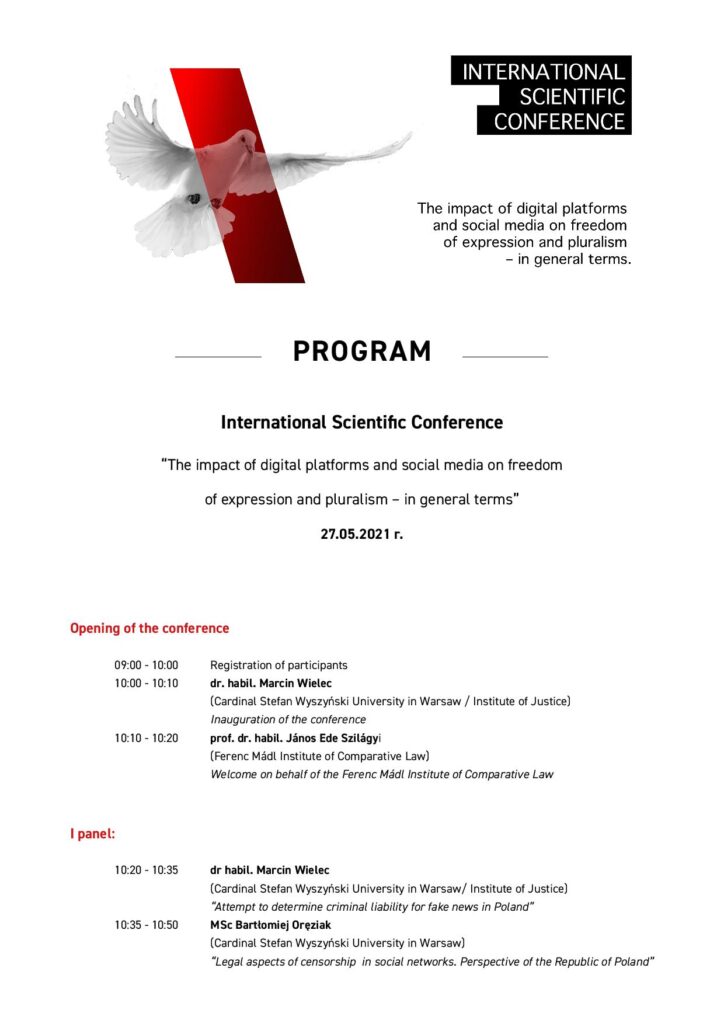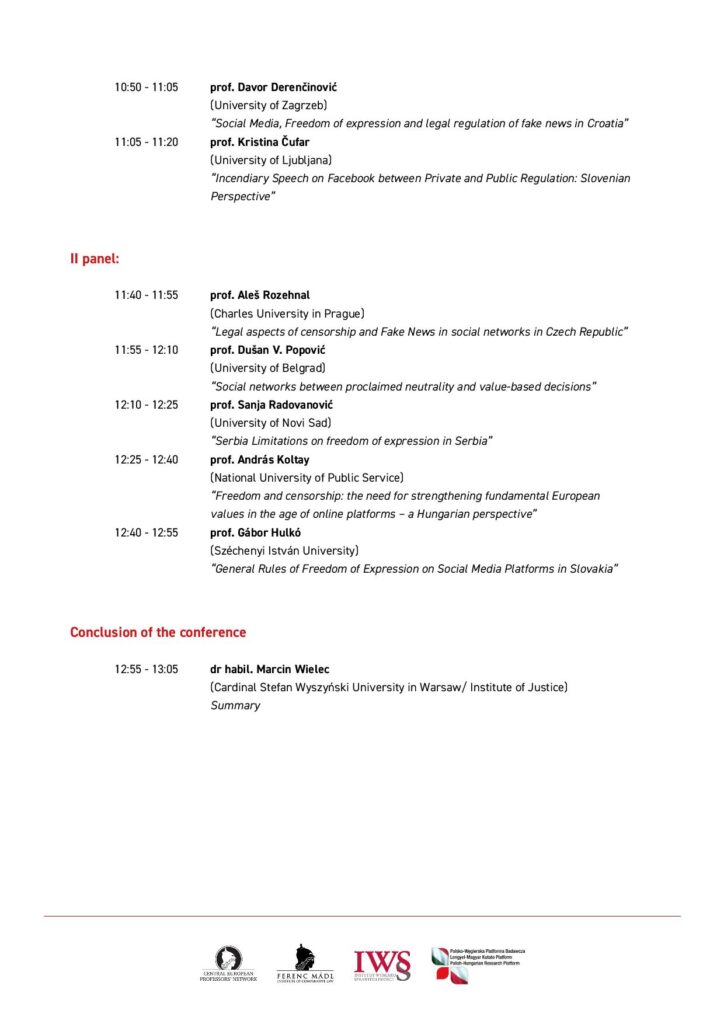On 27 May 2021, the International Scientific Conference “The impact of digital platforms and social media on freedom of expression and pluralism – in general terms” took place in Warsaw, which was organised within the Central European Professors’ Network 2021 by the Institute of Justice in Warsaw, in cooperation with the Ferenc Madl Institute of Comparative Law and the European Association for Comparative Law.
This was the first event piloted by Polish academics within the Central European Professors’ Network 2021. It is worth pointing out that the Central European Professors’ Network includes academics from countries such as the Czech Republic, Croatia, Poland, Hungary, Serbia, Slovakia and Slovenia. The aim of this project is to draw the attention of European citizens to topics that are important and relevant to the future of Europe, in particular Central Europe.
The main theme of the conference “The impact of digital platforms and social media on freedom of expression and pluralism – in general terms” were two issues related to the functioning of social media and their impact on freedom of expression and pluralism, i.e:
- an analysis of the impact of fake news on the Internet in relation to freedom of expression and pluralism of opinion;
- an analysis of the impact of online censorship on freedom of expression and pluralism of opinion.
Inauguration of Conference
The conference was officially opened by the Director of the Justice Institute and Head of the Department of Criminal Procedure at Cardinal Stefan Wyszyński University in Warsaw, prof. Marcin Wielec. He warmly welcomed the invited guests and expressed his great joy at the participation of Polish scientists in the European Professors’ Network 2021.
The Director of the Institute of Justice then gave the floor to prof. dr habil. János Ede Szilágyi – Director of the Ferenc Madel Institute of Comparative Law. Prof. János Ede Szilágyi also welcomed all the guests and said that the cooperation of scientists in Central Europe is extremely important and that initiatives such as the European Professors’ Network 2021 are essential for the integration of academia and scientific cooperation.
First expert panel
The conference was moderated by Dr. hab. Marcin Wielec, who opened the first panel with a speech entitled “Attempt to determine criminal liability for fake news in Poland”. In his speech, the IWS director pointed out the difficulties connected with determining criminal liability for fake news. He pointed out that the Polish criminal law is not adequately prepared for such phenomena as fake news. According to prof. Wielec, it is necessary to undertake detailed research on the indicated subject in order to develop solutions which will be an appropriate response to the phenomenon of fake news.
The second speaker was Coordinator of Centre for Strategic Analysis Bartłomiej Oręziak from Cardinal Stefan Wyszyński University in Warsaw. The title of his paper was “Legal aspects of censorship in social networks. Perspective of the Republic of Poland”. He pointed out the important nowadays issues of censorship in social networks, which are not embedded in the laws of individual countries. The speaker pointed out that in Poland, there are works on the regulation of censorship on social networks, but they require in-depth analysis.
The next speaker was Prof. Davor Derenčinović from the University of Zagreb. His topic was “Social Media, Freedom of expression and legal regulation of fake news in Croatia”. The professor tried to briefly present the issue of correlation between freedom of expression in social media and problems related to possible censorship of content. He also discussed issues related to the national regulation of fake news in the Croatian perspective.
The last speaker in the first panel was Prof. Kristina Čufar from the University of Ljubljana. The title of her paper was “Incendiary Speech on Facebook between Private and Public Regulation: Slovenian Perspective”. The Professor pointed out the extremely important issue of hate crime incendiary speech in the social media perspective. The topic was presented from the perspective of public and private regulation on the example of Slovenia.
Second expert panel
The first speaker of this panel was Prof. Aleš Rozehnal from Charles University in Prague. In his speech, the Professor addressed the issue of censorship and fake news in social media from the perspective of the Czech Republic. Professor Aleš Rozehnal pointed out the need for an in-depth discussion of this issue in the legal perspective.
The floor was then taken by Prof. Dušan V. Popović from the University of Belgrade. The topic of his speech was: “Social networks between proclaimed neutrality and value-based decisions”. In his speech, he pointed to the issue of political neutrality and the issue of value in social media. Using concrete examples, he pointed out that the issue of worldview neutrality of social media should be researched. He also pointed out that despite all attempts, we cannot fully dissociate ourselves from the values we adopt when making decisions.
The next speaker was Prof. Sanja Radovanović from the University of Novi Sad. The title of her paper was “Serbia Limitations on freedom of expression in Serbia”. The professor pointed out the important issues of limitations on freedom of speech and freedom of expression in the perspective of social media. She pointed out that social media platforms, which until recently were the guarantors of the indicated human rights, have recently started to gradually restrict them.
The fourth speaker was Prof. András Koltay from the National University of Public Service. The topic of his presentation was: “Freedom and censorship: the need for strengthening fundamental European values in the age of online platforms – a Hungarian perspective”. In his paper, the professor pointed out that in the time of the rapid development of social media and European integration, we cannot forget about values. Here, the professor pointed to the Hungarian perspective, which is based on the foundations of Christian civilisation.
The last speaker at the conference was Professor Gábor Hulkó from Széchenyi István University. The title of his paper was “General Rules of Freedom of Expression on Social Media Platforms in Slovakia”. In his speech he discussed the most important issues of freedom of speech and freedom of expression in the context of social media use in the perspective of the Slovak Republic.
Summary
At the very end of the event, the floor was once again taken by prof. Marcin Wielec, who thanked everyone for coming and for the papers delivered. According to the professor, this is an introduction to a great project which will allow to develop comprehensive and interdisciplinary solutions for the regulation of social media and their impact on freedom of speech and expression. He pointed out that the International Scientific Conference “The impact of digital platforms and social media on freedom of expression and pluralism – in general terms” provided an opportunity for Central European researchers to exchange experiences on phenomena such as social media censorship and fake news.



